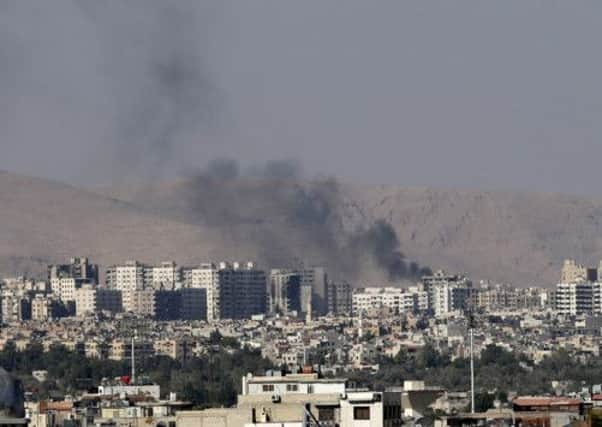Syria: United States naval forces moving closer


The move came as United Nations disarmament chief Angela Kane arrived in Damascus to push the Syrian government for access to the alleged site of a chemical weapons attack, and Médecins Sans Frontières (MSF) confirmed hospitals it supports in Syria treated about 3,600 patients with “neurotoxic symptoms”, 355 who later died.
Syria’s opposition said hundreds of people were killed in a night-time government assault in the town of Ghouta last Wednesday. Unverified footage shows civilians – many of them children – dead or suffering from what appeared to be horrific symptoms consistent with a chemical attack. The allegations have caused international outrage.
Advertisement
Hide AdAdvertisement
Hide AdLast night, charity MSF said patients had arrived in three hospitals in the Damascus governorate on 21 August – when opposition activists say chemical attacks were launched against rebels. It appears to provide further evidence of chemical weapons use.
Obama has emphasised that a quick intervention in the Syrian civil war would be problematic, given the international considerations that should precede a military strike. His defence secretary, Chuck Hagel, yesterday declined to discuss any specific force movements while saying that the president had asked the Pentagon to prepare military options for Syria.
US defence officials said that the navy had sent a fourth warship armed with ballistic missiles into the eastern Mediterranean, but without immediate orders for any missile launch into Syria.
US navy ships are capable of a variety of military actions, including launching Tomahawk cruise missiles – as they did against Libya in 2011 as part of an international action that led to the overthrow of Colonel Muammar al-Gaddafi.
Hagel said: “The defence department has a responsibility to provide the president with options for contingencies, and that requires positioning our forces, positioning our assets, to be able to carry out different options – whatever options the president might choose.”
He said that the US was co-ordinating with the international community to determine “what exactly did happen” near Damascus last week. If proven, it would be the most heinous use of chemical weapons since Iraqi despot Saddam Hussein gassed thousands of Kurds in the town of Halabja in 1988.
The Assad regime in Syria has denied allegations that it was behind last week’s attack, calling them “absolutely baseless” and suggesting they were an attempt to discredit his government.
Meanwhile, Syrian state media yesterday said that chemical agents had been found in rebel-held areas.
Advertisement
Hide AdAdvertisement
Hide AdSyrian television said soldiers had “suffocated” as they tried to enter Jobar – one of the towns in the Ghouta district around Damascus reportedly attacked last Wednesday.
The foreign ministries of Russia and Iran, both allies
of Syria, have separately accused rebels of using chemical weapons. Damascus has called the allegations against the regime as “illogical and fabricated”.
France’s foreign minister, Laurent Fabius, said yesterday that “all the information at our disposal converge to indicate that there was a chemical massacre near Damascus and that the [regime of Assad] is responsible”.
A day earlier, Foreign Secretary William Hague said he believed that “this is a chemical attack by the Assad regime” and it was “not something that a humane or civilised world can ignore”.
UN secretary-general Ban Ki-moon said he was determined to “conduct a thorough, impartial and prompt investigation” into the events.
He has sent Kane to press the Syrian authorities to allow a team of 20 experts on chemical weapons – already in Damascus – to investigate the claims.
The US, meanwhile, is facing rising pressure to intervene. Obama has so far remained cautious about getting involved in a war that has killed more than 100,000 people and now involves Hezbollah and al-Qaeda.
He made no mention of the “red line” of chemical weapons use that he marked out for Assad a year ago and that US intelligence says has been breached at least on a small scale several times since.
Advertisement
Hide AdAdvertisement
Hide Ad“If the US goes in and attacks another country without a UN mandate and without clear evidence that can be presented, then there are questions in terms of whether international law supports it – do we have the coalition to make it work?” Obama said on Friday. “Those are considerations that we have to take into account.”
Obama conceded in an interview on CNN’s New Day programme that the episode is a “big event of grave concern” that requires American attention. He said that any large-scale chemical weapons usage would affect “core national interests” of the United States and its allies. But nothing he said signalled a shift toward direct US action.
US defence officials spoke on condition of anonymity because they were not authorised to discuss ship movements publicly. But if the US wants to send a message to Assad, then the most likely military action would be a Tomahawk missile strike, launched from a ship in the Mediterranean.
For a year now, Obama has threatened to punish Assad’s regime if it resorted to its chemical weapons arsenal, among the world’s largest, saying use or even deployment of such weapons of mass destruction constituted a “red line” for him.
A US intelligence assessment concluded in June that chemical weapons have been used in Syria’s civil war, but Washington has taken no military action against Assad’s forces. US officials have instead focused on trying to organise a peace conference between the government and opposition.
Obama has authorised weapons deliveries to rebel groups, but none are believed to have been sent so far.
In his first comments on Syria since the alleged chemical attack, Obama said the US was still trying to find out what had happened.
Hagel said on Friday that a determination on the chemical attack should be made swiftly because “there may be another attack coming”, although he added that “we don’t know” whether that will happen.
The UN says more than 100,000 people have been killed since the uprising against the Assad dynasty began more than two years ago.